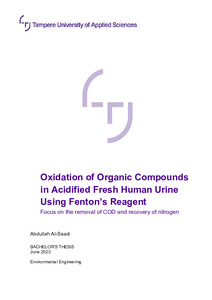Oxidation of organic compounds in acidified fresh human urine using Fenton's reagent : focus on the removal of COD and recovery of nitrogen
Al-Saadi, Abdullah Jr (2023)
Al-Saadi, Abdullah Jr
2023
All rights reserved. This publication is copyrighted. You may download, display and print it for Your own personal use. Commercial use is prohibited.
Julkaisun pysyvä osoite on
https://urn.fi/URN:NBN:fi:amk-2023061223573
https://urn.fi/URN:NBN:fi:amk-2023061223573
Tiivistelmä
Urine is a nutrients-rich containing solution that can be retained and utilized for agricultural purposes. Unfortunately, it is considered a waste that is lost in the existing conventional wastewater treatment. Swedish University of Agricultural Sciences (SLU) has conducted technologies that concern the treatment of source-separated urine aiming to convert human urine to a green fertilizer.
However, this technology is limited due to the presence of high concentrations of organic compounds in urine, which obstruct the urine dehydration process to produce a solid fertilizer. This research aims to provide a practical solution for removing organic compounds from urine by using the Fenton reagent-based Advanced Oxidation Process (AOP).
The results of the study demonstrated an 80% removal in the Chemical Oxygen Demand (COD) from urine. Further analysis showed a 30% decrease in nitrogen concentration in urine after the treatment. The loss in nitrogen is attributed to the oxidation of chloride ions forming chloride radicals, that oxidise nitrogen compounds to nitrogen gas N2 in a series of reactions. Moreover, phosphorus ions were found to react with ferrous/ferric iron, leading to the formation of iron phosphate (precipitate).
The outcomes of this research can be implemented to enhance urine treatment at SLU. Furthermore, this study contributes to Sustainable Development Goals 2, 3, and 6 in promoting food security, contributing to public health, and improving water sanitation.
Further research will be conducted to investigate the fate of pharmaceutical by-products found in the urine after the Fenton oxidation process. Another research project will also aim to enhance nitrogen and phosphorus recovery observed in this study.
However, this technology is limited due to the presence of high concentrations of organic compounds in urine, which obstruct the urine dehydration process to produce a solid fertilizer. This research aims to provide a practical solution for removing organic compounds from urine by using the Fenton reagent-based Advanced Oxidation Process (AOP).
The results of the study demonstrated an 80% removal in the Chemical Oxygen Demand (COD) from urine. Further analysis showed a 30% decrease in nitrogen concentration in urine after the treatment. The loss in nitrogen is attributed to the oxidation of chloride ions forming chloride radicals, that oxidise nitrogen compounds to nitrogen gas N2 in a series of reactions. Moreover, phosphorus ions were found to react with ferrous/ferric iron, leading to the formation of iron phosphate (precipitate).
The outcomes of this research can be implemented to enhance urine treatment at SLU. Furthermore, this study contributes to Sustainable Development Goals 2, 3, and 6 in promoting food security, contributing to public health, and improving water sanitation.
Further research will be conducted to investigate the fate of pharmaceutical by-products found in the urine after the Fenton oxidation process. Another research project will also aim to enhance nitrogen and phosphorus recovery observed in this study.
